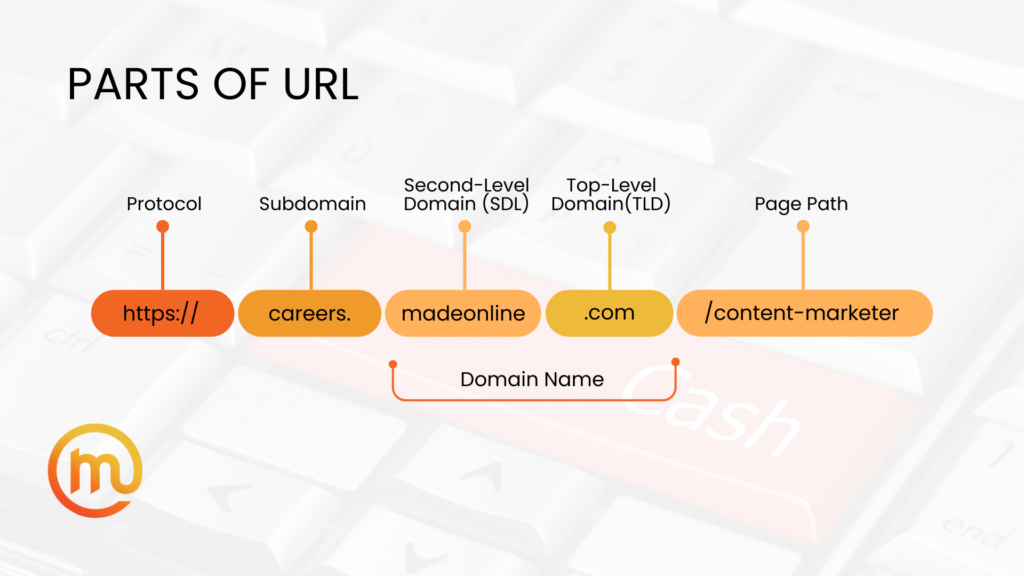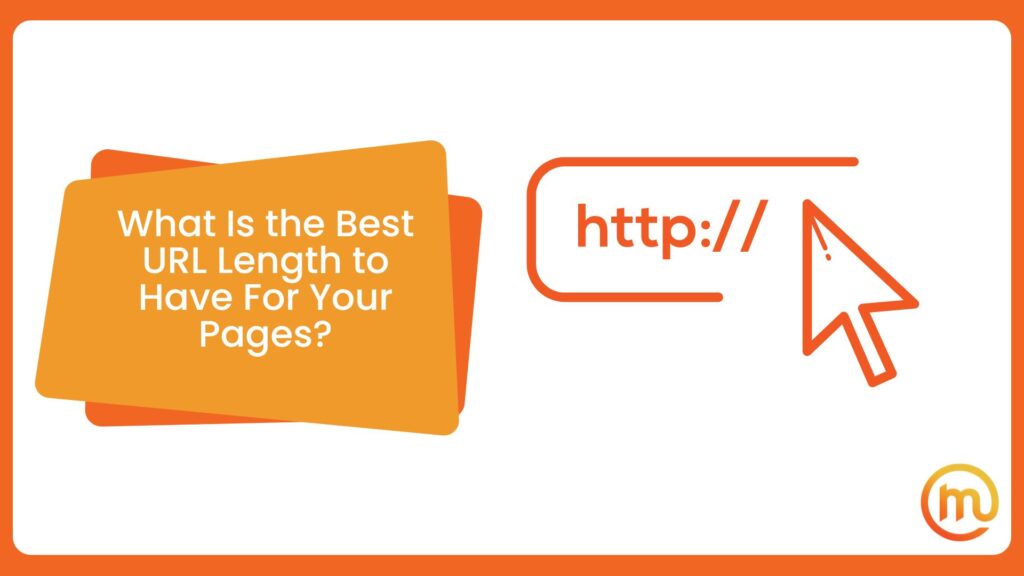Optimizing your website’s URL length is crucial for better search engine rankings and user experience. A study shows that shorter URLs, averaging 66 characters, rank higher on Google. The best URL length for your pages is typically between 50-60 characters. This length is concise enough to be easily read, remembered, and shared by users, while also being descriptive enough for search engines to understand the content of the page.
Understanding URL Length and Its Impact on SEO
A URL, or Uniform Resource Locator, is the web address used to access a specific resource on the internet. It consists of several components, including the protocol (HTTP or HTTPS), domain name (www.example.com), path (/page), and optional parameters or queries (?id=123). Each part plays a role in guiding users and search engines to the right content. The length of a URL is one of the factors that can boost SEO as it affects both search engine rankings and user experience.
That’s why an experienced SEO digital marketing agency will always use shorter, concise URLs that are easier for users to read, share, and remember. Also, search engines often prefer them because they are less likely to be abbreviated in search results. Optimizing the web address can enhance your site’s visibility too, so it should be a part of the overall SEO strategy.

How Does This Affect Search Engine Rankings and User Experience?
Keep in mind that the first website was launched on August 6, 1991, at CERN in Switzerland. Since then, there have been numerous modifications that have led us to the optimal results nowadays. Following the latest marketing trends, it’s easy to conclude that URLs should be concise yet descriptive, typically between 50 and 60 characters.
Applying a standard URL length limit directly influences both search engine rankings and user experience. Shorter addresses are easier for users to read, remember, and share, which can increase click-through rates and overall engagement and bring more people to your site. From an organic SEO agency perspective, concise URLs are favored by search engines as they are simpler to crawl and index.

URL Limit Size – Comparison of Short vs. Long URLs
When optimizing URLs for SEO, understanding the differences between short and long URLs is essential. There are several differences that impact both user experience and rankings. Here’s a comparison to help you determine the best approach for your website.
| Aspect | Short URLs | Long URLs |
| SEO Performance | Often rank higher in search results | Can rank lower due to abbreviation |
| User Experience | Easier to read, remember, and share | Harder to read, less memorable |
| Click-Through Rates (CTR) | Higher CTR due to better readability | Lower CTR due to complexity |
| Link Sharing | More likely to be shared and clicked on | Less likely to be shared |
| Crawling and Indexing | Easier for search engines to crawl and index | More complex, and can be difficult to crawl |
| URL Management | Simpler to manage and organize | Can become unwieldy and difficult to manage |
Best Practices for Creating SEO-Friendly URLs
Creating SEO-friendly URLs is a fundamental aspect of optimizing your website for search engines and enhancing user experience. Partnering with an SEO and digital content agency, of course, you can expect the best practices. That way the URLs will be both efficient and effective in driving organic traffic. Here are some key practices professionals follow:
- Keep URLs short and descriptive – Optimized web addresses have between 50-60 characters, as shorter ones tend to rank higher and are easier for users to read and share.
- Use keywords wisely – Using relevant keywords helps search engines understand the content of your page and improve your rankings. The title tags of Google’s top 10 results contain 65% to 85% of their ranking keywords.
- Avoid special characters and spaces – Professionals stick to alphanumeric characters and hyphens to separate words. Avoid using spaces, underscores, and special characters.
- Use hyphens, not underscores – Hyphens are preferred over underscores as word separators in URLs, as search engines interpret hyphens as spaces.
- Avoid stop words – Removing unnecessary stop words like “and,” “or,” and “but” to keep web addresses concise and focused.
- Use lowercase letters – Sticking to lowercase letters avoids issues with case sensitivity and ensures consistency across the URLs.
- Ensure URLs are static – An experienced SEO marketing agency uses static URLs rather than dynamic ones with parameters, as these are easier for search engines to index and for users to understand.
- Create a logical structure – Organized web addresses to reflect the site’s structure and hierarchy, makes it easier for users to navigate and for search engines to crawl.
- Use canonical tags for duplicate content: Implement canonical tags to indicate the preferred version of a URL when you have multiple pages with similar content.
It’s Not Just for SEO – User Experience and Readability Are Important Too
Short, clear URLs enhance user experience by making it easier for users to read, remember, and share links. They improve navigation and clarity, contributing to higher click-through rates in search results. Search engines gave “trusted domains” a greater click-through rate (CTR) than did unfamiliar sites. According to a Microsoft study, trusted domains have greater CTR. This is based on the assumption that users of search engines use the URL of a page to choose which result best matches their query.
Limitations and Guidelines From Search Engines
Search engines impose guidelines and limitations on URL length to ensure optimal indexing and user experience. While there is no strict character limit universally enforced, Google recommends keeping the max length of a URL under 2,000 characters to avoid truncation in search results.
Also, did you know that search engines prefer addresses that are descriptive, relevant, and easy to understand? If these guidelines are followed, the site’s visibility and usability will be improved. And with the help of an experienced content strategy agency, you’ll ensure that both users and search engines can navigate your content effectively.

Check Our Some Common Mistakes to Avoid
Avoiding common pitfalls is essential for maintaining effective SEO practices and enhancing user experience. Here are some key mistakes to steer clear of:
- Having very long URLs: Extremely long addresses, exceeding recommended limits, can lead to truncation in search engine results, making them less appealing and harder to understand for users. They may also affect SEO by reducing click-through rates and complicating site navigation.
- Keyword stuffing in URLs: While it’s important to include relevant keywords in the address, excessive use of keywords (keyword stuffing) can appear unnatural and can be spam. This practice can harm your SEO efforts and may result in penalties from search engines.
- Dynamic URLs and session IDs: Dynamic URLs with parameters (for example, ?id=123) and session IDs can create issues for SEO. These are often difficult for search engines to crawl and index properly, leading to indexing errors and duplicate content issues. It’s advisable to use a static web address whenever possible to improve site visibility and user accessibility.
By avoiding these pitfalls and partnering with professionals at Made Online, businesses can effectively optimize their SEO strategies and enhance their online presence. Made Online specializes in crafting customized digital marketing solutions that drive results, including SEO optimization, content strategy, social media, and more.

Ready to Optimize Your Website With Made Online?
Optimizing URL length is one of the effective steps for improving the overall presence of your site. When the URLs are concise, using relevant keywords, and ensuring clarity, businesses can boost search engine rankings and attract more organic traffic. At Made Online, we specialize in tailored SEO solutions that maximize visibility and drive results.
Whether you need URL optimization or broader digital marketing strategies, contact Made Online today for a free consultation. Let us help you achieve your business goals with our proven expertise. Reach out now to embark on a path to greater online success.

